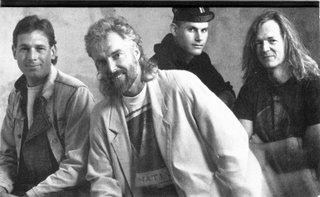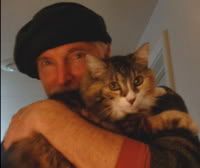A Year in Erik's World

The Buddhists have a rule of thumb: whenever you say goodbye to someone, do it as if for the last time… for it may very well be the last time. I wish I’d observed this rule of thumb with Erik Kleven (pictured far right). Surely I’d see him around, I thought. He was ubiquitous in the Sacramento music scene. When he played bass in my band he was also playing in about four other bands. He was always in demand. How could you miss seeing or hearing him somewhere someday? We take these things for granted.
Then my sister called with the news that at 3:00 Sunday afternoon Erik was killed driving to a gig when a Volvo coming from the opposite direction crossed the lane and hit him head on. Instantly someone who routinely touched countless people every day and night had vanished forever. Such incidents jar us awake (briefly) to the fact that we are like the smoke curling from one of those American Indian cigarettes Eric used to smoke. In a twinkling, the slightest whiff of breeze can scatter us to the winds.
Time and circumstances can also remove someone from one’s life. I moved to the coast and started writing a book and when I heard about what happened it dawned on me that I hadn’t seen him in a decade. It didn’t matter. Once you’ve gotten to know this guy he’s like something lodged in your chest. The news knocked the wind out of me.
He was always a bit of an icon for me. The bass player of choice for the local musicians I admired— musician's like Shelley Burns, Henry Robinett, Chris Webster, Jessica Williams. As we got to know each other he remained an icon— the consummate professional, the bemused older brother with the knowing smile, quiet and self-possessed. The boys in the band had their rock and roll dreams. Eric already had what he wanted— family, a good gig teaching bass and tuba (He called it the “blow bass”), his books, his maturity, playing music with his friends.
Once I groused to him that though the band had gotten tight enough to record an album we weren’t making enough money to make that album. He said, “It’s not about the money. It’s about the music.” It was certainly true for him. Though I always made sure my musicians got paid a decent wage (even if I didn’t) Erik worked for a number of bands in which creative satisfaction was often the only remuneration.
Of course, he was right. Our rehearsals were just as much fun as the gigs— the joking, the camaraderie, the common determination to fuse our talents into something extraordinary. Exciting times. This was Erik’s life 'til the day he died.
In my mind it was more than a band, of course. It was my music support group. That group provided a defining experience for me. Erik will always be a part of who I am because of it. I’m sure many others could say the same. In this and other ways, he lives on. Let the Eric sightings begin.
I am currently working on an album that includes many of the tunes I played with Eric. I find myself listening to tapes of our live performances to remember how he played those bass lines. Always straightforward. Simple. Elegant.
I feel so fortunate to have a few studio quality recordings of us playing together. I remember he always turned the treble knob of his bass to zero so the engineer could never “funkify” his sound. And I remember he always nailed his track on the first take.
If we’d have known that Erik was going to be taken from us so suddenly I’m sure we would have cheered a little louder after each song he played. But it wouldn’t have mattered much to him. He wasn’t there for the applause. As he said, “It’s all about the music.” He was a very Zen character. If the rhythm was right, he would have been gratified by the sound of one hand clapping.
Erik was like the beat he kept. Rock steady.


0 Comments:
Post a Comment
<< Home